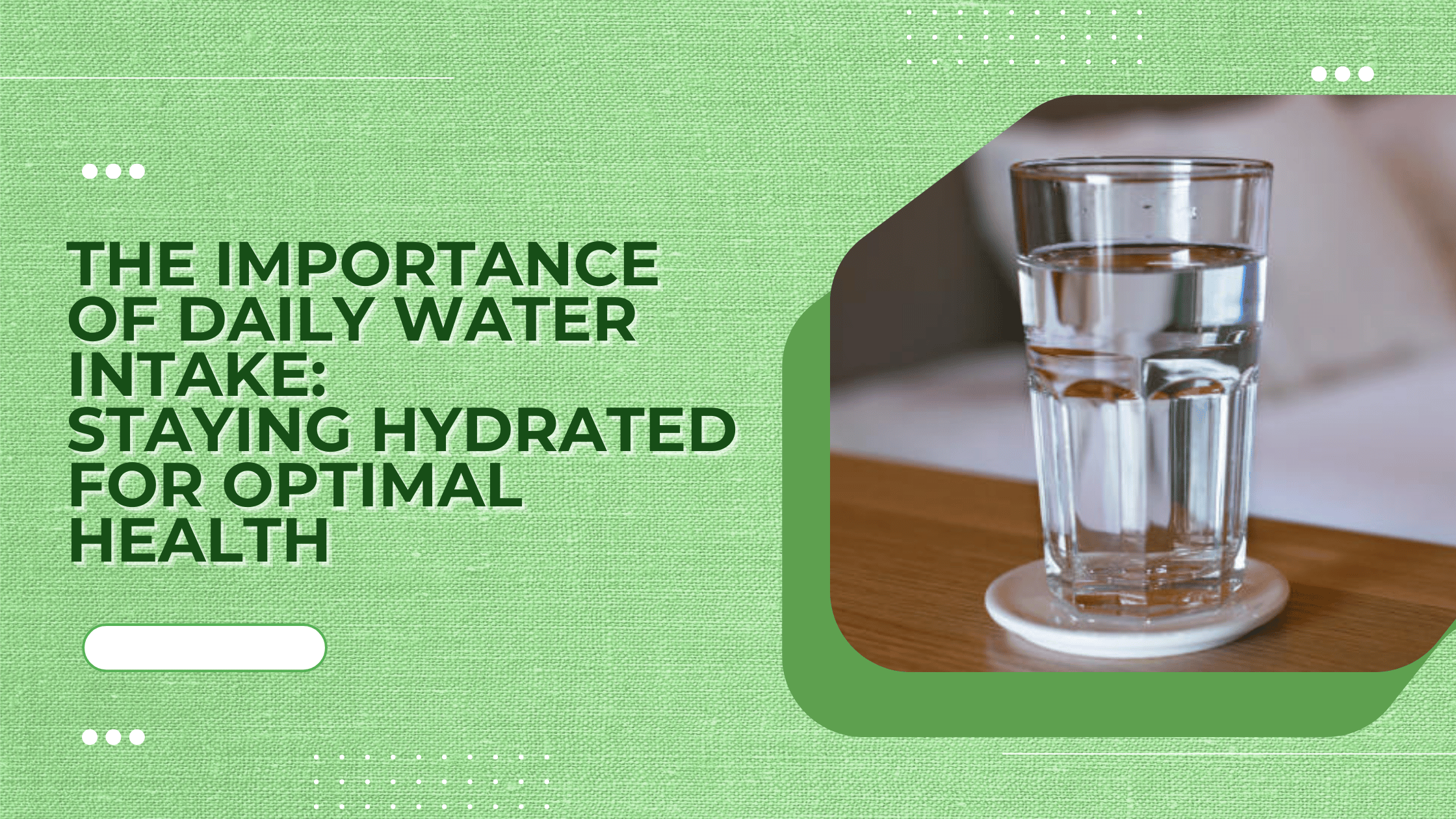Water is the essence of life. Every cell, tissue, and organ in your body needs water to function correctly. Yet, many of us overlook the importance of adequate hydration. This article explores the significance of daily water intake, its benefits, and practical tips to ensure you stay hydrated.
Understanding the Role of Water in the Body
Why is Water Essential?
Water is crucial for numerous bodily functions:
- Regulating Body Temperature: Water helps regulate body temperature through sweating and respiration. This process is vital for preventing heat-related illnesses such as heat stroke and heat exhaustion (Mayo Clinic Health System) (ILiveActive).
- Lubricating Joints: Water acts as a lubricant for joints, reducing friction and ensuring smooth movement. This helps maintain joint flexibility and prevent pain (Mayo Clinic Health System) (ILiveActive).
- Protecting Tissues: Water cushions and protects vital organs and tissues, acting as a shock absorber inside the eyes, spinal cord, and amniotic sac during pregnancy (ILiveActive).
- Aiding Digestion: Water is crucial for digestion, aiding in the breakdown and absorption of nutrients. It also helps prevent constipation by softening stools (Mayo Clinic Health System) (ILiveActive).
- Removing Waste: Water assists in the removal of waste products through urination, perspiration, and bowel movements. Proper hydration supports kidney function and reduces the risk of kidney stones and urinary tract infections (The Nutrition Source) (ILiveActive).
How Much Water Do You Need?
The recommended daily water intake can vary based on age, sex, weight, and activity level. A general guideline is:
- Men: About 3.7 liters (13 cups) of fluids per day.
- Women: About 2.7 liters (9 cups) of fluids per day.
These recommendations include all fluids consumed, not just water, as about 20% of daily fluid intake usually comes from food (Mayo Clinic) (Mayo Clinic Health System).
Benefits of Staying Hydrated
- Enhanced Physical Performance: Dehydration can significantly impact physical performance by reducing endurance and increasing fatigue. Staying hydrated helps maintain energy levels and muscle function, leading to improved overall performance during physical activities (Verywell Health) (Sunwarrior UK).
- Improved Cognitive Function: Even mild dehydration can impair cognitive functions, such as concentration, alertness, and short-term memory. Drinking enough water supports brain function and helps maintain mood stability (Warren General Hospital ) (Verywell Health).
- Better Digestion and Nutrient Absorption: Water is crucial for healthy digestion as it aids in breaking down food and ensuring smooth passage through the intestines. Adequate hydration prevents constipation and supports efficient nutrient absorption (Verywell Health) (Sunwarrior UK).
- Weight Management: Drinking water can aid in weight management by helping control appetite. Sometimes, our bodies confuse thirst with hunger, leading to unnecessary snacking. Drinking water before meals can help prevent overeating and support weight loss efforts (Verywell Health) (Sunwarrior UK).
- Detoxification: Water helps flush out toxins and waste products from the body through urine and sweat. Proper hydration supports kidney function, reducing the risk of kidney stones and urinary tract infections (Verywell Health) (Sunwarrior UK).
Practical Tips for Staying Hydrated
Start Your Day with Water
Begin your day with a glass of water to kickstart your metabolism and hydrate your body after a night’s sleep. It’s a simple habit that can make a big difference.
Carry a Water Bottle
Having a water bottle with you throughout the day serves as a constant reminder to drink. Choose a reusable bottle to help reduce plastic waste and stay environmentally conscious.
Set Reminders
Use phone apps or alarms to remind you to drink water at regular intervals. These small prompts can help you develop a consistent hydration habit.
Infuse Your Water
If you find plain water boring, add a splash of flavor with natural infusions. Fresh fruits, herbs, and vegetables like lemon, mint, cucumber, or berries can make drinking water more enjoyable.
Monitor Your Urine
Pay attention to the color of your urine. Clear or light-colored urine typically indicates adequate hydration, while dark yellow urine suggests you need to drink more water.
Eat Water-Rich Foods
Incorporate water-rich foods into your diet, such as cucumbers, oranges, watermelon, strawberries, and lettuce. These can contribute to your overall fluid intake.
Overcoming Common Hydration Challenges
Busy Schedules
In fast-paced environments, it’s easy to forget to drink water. To make hydration a priority, incorporate it into your daily routine by drinking a glass of water with each meal and snack, and setting specific times for water breaks. Having a water bottle handy and using hydration reminder apps can also be effective (Wellness Magazine) (Virtual Steps Challenge).
Physical Activity
Increased physical activity raises your body’s need for water. It’s essential to drink water before, during, and after exercise to replenish lost fluids and support recovery. Keeping water accessible during workouts and using electrolyte-enhanced beverages can help maintain hydration levels (Wellness Magazine) (Virtual Steps Challenge).
Environmental Factors
Hot and humid weather can lead to increased fluid loss through sweat. In such conditions, it’s important to drink more water than usual. Staying hydrated can prevent heat-related illnesses and ensure that your body functions optimally in challenging climates (Virtual Steps Challenge).
Age-Related Changes
As we age, our sense of thirst may diminish, making it crucial for older adults to consciously drink water regularly, even if they don’t feel thirsty. Dehydration in older adults can lead to serious health issues, including cognitive impairment and increased risk of hospital admissions. Therefore, it’s important to establish a routine of regular hydration and to monitor fluid intake closely (MDPI).
For more detailed information on the benefits of staying hydrated and strategies to overcome hydration challenges, you can visit these sources:
The Risks of Dehydration
Recognizing Dehydration Symptoms
Dehydration can have serious consequences if not addressed. Symptoms include:
- Dry Mouth and Throat: A common early sign.
- Fatigue and Weakness: Feeling unusually tired and sluggish.
- Dizziness and Lightheadedness: Especially when standing up quickly.
- Dark Urine: A clear indicator of inadequate water intake.
- Headaches: Dehydration can trigger headaches and migraines.
Severe Dehydration
Severe dehydration requires immediate medical attention. Symptoms include:
-
- Extreme Thirst: Intense craving for water indicates significant fluid loss and the body’s urgent need for rehydration (Northern Inyo Healthcare) (Lifespan).
- Rapid Heartbeat and Breathing: These signs show that the body is struggling to maintain blood pressure and oxygen levels due to inadequate fluid volume (Northern Inyo Healthcare) (Lifespan).
- Sunken Eyes and Dry Skin: These are visible indicators of severe fluid loss and dehydration, reflecting the body’s reduced ability to maintain normal hydration levels (Northern Inyo Healthcare) (Lifespan).
- Confusion and Irritability: Impaired cognitive function occurs because dehydration affects brain function, leading to symptoms like confusion and irritability (Northern Inyo Healthcare) (Lifespan).
Frequently Asked Questions (FAQs)
How can I increase my daily water intake if I don’t like plain water? You can infuse your water with natural flavors from fruits, vegetables, or herbs. Drinking herbal teas or consuming water-rich foods can also help increase your hydration (Mayo Clinic Health System) (Cleveland Clinic).
Is it possible to drink too much water? Yes, overhydration can occur, leading to a condition called hyponatremia, where the sodium levels in your blood become too diluted. This is rare and usually happens with excessive water intake over a short period (Cleveland Clinic).
Does caffeine or alcohol affect hydration? Both caffeine and alcohol are diuretics, which can increase urine output and potentially lead to dehydration. It’s essential to balance these with adequate water intake (Cleveland Clinic).
What are the best times to drink water? Spread your water intake throughout the day. Drink water when you wake up, before and during meals, before, during, and after exercise, and before going to bed (Cleveland Clinic).
Can I count other beverages towards my daily water intake? Yes, other beverages like milk, juice, and herbal teas contribute to your daily fluid intake. However, be mindful of the added sugars and calories in some drinks (Mayo Clinic Health System) (Cleveland Clinic).
Water is a fundamental component of a healthy lifestyle. By understanding the importance of daily water intake and incorporating practical tips to stay hydrated, you can improve your overall health and well-being. Remember, staying hydrated is a simple yet powerful step towards a healthier you.




